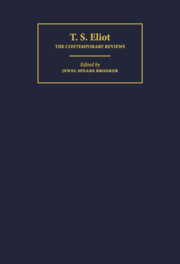Book contents
- Frontmatter
- Contents
- Series Editor's Preface
- Introduction
- Acknowledgments
- Prufrock and Other Observations (1917)
- Poems (1919); Ara Vos Prec (1920); Poems (1920)
- The Sacred Wood: Essays on Poetry and Criticism (1920, 1921)
- The Waste Land (1922)
- Homage to John Dryden (1924)
- Poems 1909–1925 (1925)
- For Lancelot Andrewes: Essays on Style and Order (1928, 1929)
- Dante (1929); Animula (1929); Marina (1930)
- Ash-Wednesday (1930)
- Selected Essays 1917–1932 (1932)
- Sweeney Agonistes (1932)
- The Use of Poetry and the Use of Criticism (1933)
- After Strange Gods: A Primer of Modern Heresy (1934)
- The Rock (1934)
- Murder in the Cathedral (1935)
- Collected Poems 1909–1935 (1936)
- The Family Reunion (1939)
- The Idea of a Christian Society (1939)
- East Coker (1940); Burnt Norton (1941); The Dry Salvages (1941); Little Gidding (1942); Four Quartets (1943)
- Notes Towards the Definition of Culture (1948, 1949)
- The Cocktail Party (1949, 1950)
- The Confidential Clerk (1954)
- The Elder Statesman (1959)
- Index
After Strange Gods: A Primer of Modern Heresy (1934)
Published online by Cambridge University Press: 10 March 2010
- Frontmatter
- Contents
- Series Editor's Preface
- Introduction
- Acknowledgments
- Prufrock and Other Observations (1917)
- Poems (1919); Ara Vos Prec (1920); Poems (1920)
- The Sacred Wood: Essays on Poetry and Criticism (1920, 1921)
- The Waste Land (1922)
- Homage to John Dryden (1924)
- Poems 1909–1925 (1925)
- For Lancelot Andrewes: Essays on Style and Order (1928, 1929)
- Dante (1929); Animula (1929); Marina (1930)
- Ash-Wednesday (1930)
- Selected Essays 1917–1932 (1932)
- Sweeney Agonistes (1932)
- The Use of Poetry and the Use of Criticism (1933)
- After Strange Gods: A Primer of Modern Heresy (1934)
- The Rock (1934)
- Murder in the Cathedral (1935)
- Collected Poems 1909–1935 (1936)
- The Family Reunion (1939)
- The Idea of a Christian Society (1939)
- East Coker (1940); Burnt Norton (1941); The Dry Salvages (1941); Little Gidding (1942); Four Quartets (1943)
- Notes Towards the Definition of Culture (1948, 1949)
- The Cocktail Party (1949, 1950)
- The Confidential Clerk (1954)
- The Elder Statesman (1959)
- Index
Summary
R. P. Blackmur.
"The Dangers of
Authorship."
Hound and Horn 7
(1934), 719–26.
Mr. Cowley [in Exile's Return] and Mr. Eliot [in After Strange Gods] are looking—but neither together nor in the same direction—for a living standard of approach to literature. Neither, in the books before us, is primarily a literary critic—as indeed their subtitles attest; neither attacks his problem from within the field of literature as an art that finds autonomy in its practice, and neither fortifies himself in any logic of aesthetics. Each, rather, regards literature as it interprets life rightly or wrongly, with reference to a general, complete view of life as distinguished from the free, uncontrolled, merely literary view. Each deeply realizes that literature does not ever in fact—at least in the degree that it is serious—escape into thin air without first influencing the moral and spiritual life of its readers; and each therefore requires that literature assent, for its own salvation, or at least to secure its best possibilities, to a definite intellectual and spiritual discipline. Mr. Eliot asserts the discipline of Christian orthodoxy and provides examples of the evils that result from ignoring it. Mr. Cowley suggests a discipline that rises from an honest recognition of the class-struggle and all its implications in economic and political life; and he provides us with a comparative history of recent literary futility as it resulted from a distorted emphasis upon the individual.
- Type
- Chapter
- Information
- T. S. EliotThe Contemporary Reviews, pp. 271 - 296Publisher: Cambridge University PressPrint publication year: 2004



